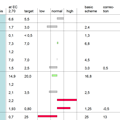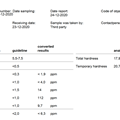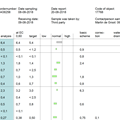Enhancing peat-free growing: A comprehensive guide to soil testing
Soil testing holds the key to optimising plant health and productivity in a peat-free environment. This integral part of modern horticulture provides a wealth of information about soil health, fertility, and overall condition, highlighting any nutrient deficiencies, EC levels and pH imbalances.
In the journey towards peat-free growing, soil testing is no longer an optional step but an essential practice. It offers growers a scientific basis for understanding their soil, facilitating informed decisions that drive optimal crop yields and environmental responsibility.
Understanding Soil Testing
The soil testing process begins with the collection of soil samples. These samples are sent to a lab where they undergo thorough analysis. A comprehensive report is generated, detailing essential nutrient levels and pH values. Often, these reports also provide recommendations for soil nutrient amendments to maximise plant nutrition, health, and productivity.
The vital role of soil testing in peat-free growing
The transition to peat-free growing mediums poses unique challenges to growers. Peat-free substrates, while more sustainable, can exhibit different physical and chemical properties compared to traditional peat, affecting water holding capacity, nutrient availability, and pH levels. Soil testing becomes invaluable in this context.
Regular soil testing can detect imbalances in nutrient levels and soil PH. For instance, some peat-free mediums have higher pH levels than peat, potentially impacting nutrient availability. Detecting and addressing these imbalances early allows for targeted fertilisation and soil amendment, enhancing soil fertility and crop productivity while minimising costs and reducing environmental impacts.
Testing your inputs for peat-free growing
There are several types of tests that are particularly relevant for peat-free horticulture:
Water analysis: Borehole/mains water analysis to understand what the water nutrient value is.
Compost analysis: This test quantifies levels of essential nutrients such as nitrogen, phosphorus, and potassium, aiding in targeted nutrient management.
Drip & drain analysis: Used primarily in hydroponic environments to analyse the plant nutrient uptake before and after feeding.
pH Test: Measures the acidity or alkalinity of the soil, which can significantly influence nutrient availability.
Importance of professional soil testing
To ensure accurate and reliable results, it's vital to use professional labs or trusted testing kits like Eurofins for our soil testing needs. By fostering a strong partnership with these laboratories, we ensure our tests yield timely results, meticulous analyses, and knowledgeable recommendations. This collaboration aids us in navigating the challenges of peat-free horticulture, safeguarding crop health, and productivity.
Regular soil testing stands as a cornerstone of successful, sustainable horticulture. It equips growers with the data they need to effectively manage their crops in a peat-free environment. Through vigilant soil testing and thoughtful interpretation of results, you too can pioneer a path towards successful, sustainable, peat-free growing.
Tests for successful peat-free growing
Speak to our growing media and fertiliser specialist
For more information about making the change to peat-free, or for technical advice and support, call our specialist Sean Whitworth on +44 7788929796 or email sean.whitworth@fargro.co.uk



